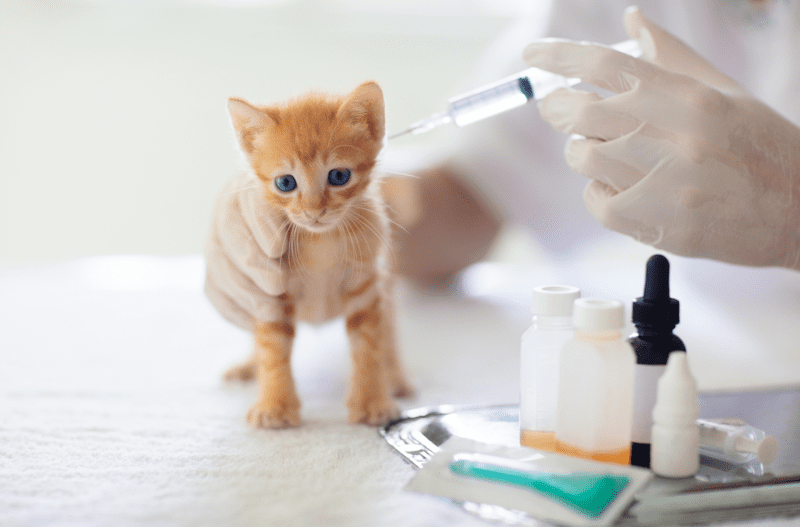Vaccinating your cat can help protect them from a range of infectious diseases that can be potentially life-threatening. Some of the vaccines recommended for cats include:
- Feline herpesvirus-1 (FHV-1) and feline calicivirus (FCV) – These viruses cause upper respiratory infections in cats and are highly contagious.
- Feline panleukopenia virus (FPV) causes feline infectious enteritis (also known as feline distemper) and can be fatal.
- Feline leukemia virus (FeLV) can lead to a weakened immune system, anemia, and other health problems.
- Rabies – This viral disease is fatal and can be transmitted to humans.
Vaccination schedules may vary depending on the cat’s age, health, and lifestyle, so it’s best to consult your veterinarian to determine the appropriate vaccination schedule for your cat.”
What Are Cat Vaccination Side Effects?
Like any medical treatment, there’s a possibility of cat vaccination side effects. Most side effects are mild and disappear within a few days, but more severe reactions can occur in rare cases. Here are some common side effects of cat vaccinations:
- Mild fever
- Lethargy or tiredness
- Loss of appetite
- Swelling or pain at the injection site
- Sneezing or nasal discharge
- Mild diarrhea or vomiting
These cat vaccination side effects are generally not cause for concern and typically resolve within a few days. However, if your cat seems uncomfortable or their symptoms persist, contact your veterinarian.
In rare cases, more serious reactions can occur, such as:
- Anaphylaxis (a severe allergic reaction)
- Hives or facial swelling
- Difficulty breathing
- Collapse or seizures
These cat vaccination side effects are infrequent and are often mild.
The risks of cat vaccination side effects are generally much lower than those associated with the diseases they protect against. However, if you have concerns about vaccinating your cat, you should discuss them with your veterinarian. They can help you weigh the risks and benefits of vaccination and determine the best course of action for your cat.
What Happens When a Cat is Vaccinated?
Vaccines are a potent tool for preventing the spread of disease. They have a proven track record of being safe, effective, and inexpensive in the medical field. Injections can protect cats from fatal and debilitating infections such as feline distemper, FeLV, and rabies.
When a cat is vaccinated, its immune system responds by producing antibodies that can be used to fend off the disease when the cat is exposed to it in the future. They can minimize the severity of future disease or prevent it entirely, but occasionally they might cause side effects.
Cat vaccination side effects are rare but possible; their appearance does not indicate poor administration or a defective vaccine. 52 out of every 10,000 cats are expected to have an adverse reaction. This occurs when the body mounts an abnormally strong or inappropriate immune response to an allergen, antigen, or vaccine.
When Cat Vaccines Cause Problems, What Can Be Done?
Most cat vaccination side effects happen quickly after immunization, usually within the first few hours. If you require immediate medical assistance, please call your veterinarian.
Warm compresses or pain medication your veterinarian gives may help most cats with moderate symptoms. Depending on the severity of the condition, your cat may need to be hospitalized and treated with medical treatment, including medicines and intravenous fluids.
Epinephrine, steroids, and antihistamines may be used alongside oxygen therapy.
How Can I Make Sure My Cat Is Safe During and After Getting Vaccinated?
Vaccinating your cat carries some risk for cat vaccination side effects, but the benefits outweigh the drawbacks. The AVMA, AAFP, and AAHA all recommend vaccination because it reduces the likelihood of potentially lethal diseases, some of which can be transmitted to humans. Vaccinating your pet is an essential component of being a conscientious owner.
Talk to your vet about the potential dangers and advantages of vaccinations and any necessary protocols if your cat has a damaged immune system or is suffering from an autoimmune condition. This is especially true if your cat has ever had an adverse reaction to a vaccine, as subsequent vaccinations may only worsen the problem. Vaccination is something you and your vet should decide on a case-by-case basis.
Primary Considerations for Cat Vaccinations
Timing of vaccinations
Kittens typically receive their first vaccinations at around 6-8 weeks, with follow-up boosters given every 3-4 weeks until they are around 16 weeks old. Adult cats may require booster shots at regular intervals to maintain immunity.
Core vaccines
The vaccines listed above (FHV-1/FCV, FPV, FeLV, and rabies) are considered “core” and are generally recommended for all cats, regardless of their lifestyle. Some veterinarians may also recommend additional vaccines based on a cat’s risk factors, such as outdoor exposure or travel.
Cat vaccination side effects
Like any medical treatment, your pet may run the risk for mild cat vaccination side effects. Most cats experience only mild cat vaccination side effects, such as lethargy or a mild fever, but more serious reactions, such as anaphylaxis (a severe allergic reaction), are possible. Your veterinarian can discuss the risks and benefits of cat vaccinations with you and help you make an informed decision.
Vaccine efficacy
While no vaccine is 100% effective, vaccination is still the best way to protect your cat from infectious diseases. Vaccinated cats may still contract a disease, but their symptoms are typically milder, and less likely to experience serious complications or death.
Vaccination schedules
Some cats, such as those who spend much time outdoors or live with other cats, may be at higher risk for certain diseases and require more frequent or specialized vaccinations. Your veterinarian can help you determine the best vaccination schedule for your cat.
Importance of booster shots
Booster shots are essential to maintaining your cat’s immunity to diseases. Without regular boosters, your cat’s immunity may wane and become disease-resistant. Follow your veterinarian’s recommendations for booster shots to ensure your cat stays protected.
Legality
In some regions, vaccines such as rabies are legally required for cats. This is to help prevent the spread of diseases to humans and other animals. Be sure to check your local laws and regulations to ensure you comply.
Cost
The cost of cat vaccinations can vary depending on the type of vaccines required and your location. While vaccinations may be an additional expense, they are essential to your cat’s health. They can save money in the long run by preventing costly veterinary bills associated with treating diseases.


